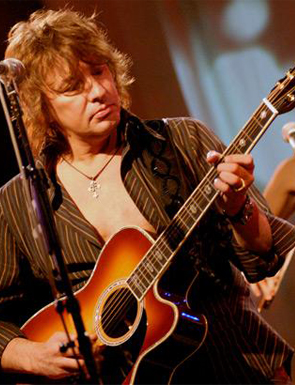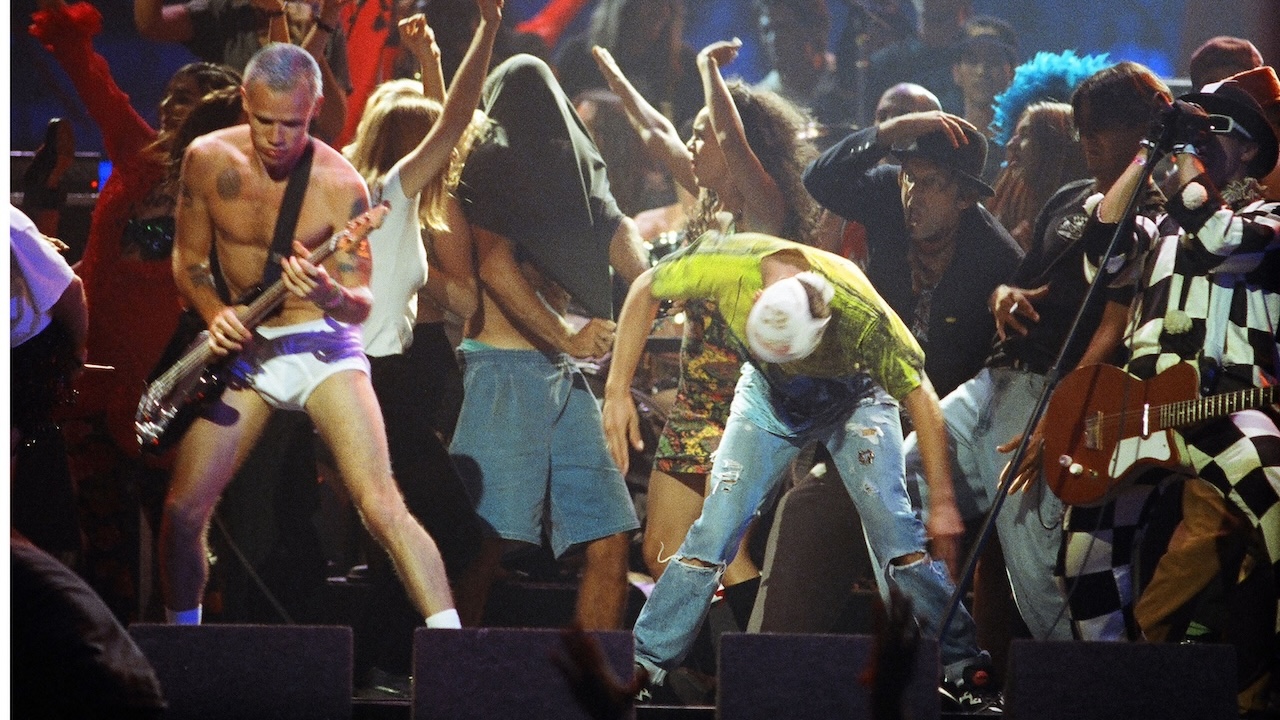Dear Guitar Hero: Richie Sambora
All the latest guitar news, interviews, lessons, reviews, deals and more, direct to your inbox!
You are now subscribed
Your newsletter sign-up was successful

He’s the longtime lead guitarist of Bon Jovi and has a collection of 135 guitars. But what Guitar World readers really want to know is…
I loved Bon Jovi’s country-flavored hit single “Who Says You Can’t Go Home” [from 2005’s Have a Nice Day] and was wondering if the band would ever consider doing a full album of country songs. —Lori Lennon
A full country album? No, I don’t think so. But as those words leave my mouth, I should add that the one thing I’ve learned in this business is to never say “never.” Hey, the Rolling Stones have had a country vibe in a lot of their songs, but somehow they always manage to sound like the Stones. So if we ever did something again that fit into the country genre, I’d want to make sure we were being true to ourselves. There might be a song or two down the line, but I don’t think we’d ever do a full country album—we’re a rock band.
You have an incredible guitar collection. With so many to choose from, how do you decide which guitar to play on any given song? —The Tank
Well, Tank, when you’ve got 135 guitars, it can be a problem. When we tour, I don’t bring a lot of my expensive, vintage guitars out with me, ’cause I’m afraid they’ll get stolen. Leave a 1959 sunburst Les Paul in a hotel room? I don’t think so! [laughs] Basically, I have my ESP Richie Sambora signature model, which is very versatile soundwise. I have a bunch of those. Then I have some Strats, a few Teles, some Les Pauls and Les Paul Juniors. My general attitude is, “whatever fits the song.” The vintage stuff I’ll use in the studio, but there’s certain pieces I’ll never take on tour. Why take the risk?
I really like the solo you do in the new song “Bullet” [from Bon Jovi’s 2009 album, The Circle]. What kind of wah-wah pedal do you use on it? Did you try recording a version without the wah? —Steven Koles
I’m glad you liked that one. I used a regular Dunlop Cry Baby wah, right out of the store. I think I did try a pass without it, but it didn’t sound quite right. I put the wah-wah on to give it a bit of a sonic lift, some added dimension. Generally, I try not to go too crazy with effects, especially a wah, which can sound kind of redundant if you’re relying on it all the time. Use effects sparingly, I say, the same way a chef uses spices.
All the latest guitar news, interviews, lessons, reviews, deals and more, direct to your inbox!
What do you think of Jon Bon Jovi’s skills on the guitar? Is he just a simple strummer, or is he capable of busting out a mind-blowing solo? —Kenny Griffen
Jon’s been getting better on the guitar. Over the past couple of years, he’s really been working on his technique. He never really played any leads until the last tour, and now he’s at the point where the two of us are even doing a couple of dual-lead solos onstage. He’s always been a terrific rhythm guitar player—very underrated, too, if you ask me.
On your first solo album, Stranger in This Town, Eric Clapton played on the song “Mr. Bluesman.” Did you feel at all intimidated to work with him? —Hannah Smith
No, I wasn’t afraid at all. I’ve been fortunate to play with a few of my heroes, and Eric is one of them. He’s a very gracious man, very humble, and he never tries to be intimidating. When I was cutting that song, he was playing at the Royal Albert Hall in London, so I went to him so he could record his part. He came down to the studio and blew out a great solo. Afterward, we went to the show together. It turned out to be a great day and evening.
On the song “Superman Tonight,” you do a very cool melodic solo. How many passes does it usually take for you to nail a solo? Do you plot them out, or do you tend to go in and wing ’em? —Michael Tyburski
A little of both. When I plot them out, I just try to get a general framework of how they should go. Otherwise, they tend to sound stale and clinical. Usually I walk in with a basic idea in my head of what the song needs. On that particular cut, I was thinking of a slinky kind of George Harrison–type lead. It didn’t take long to lay down. I had a melody in mind, I did a few passes, and it was done. Sometimes I get lucky and I’ll be a one-take guy; other times, I have to build solos, particularly if they’re long or if I’m trying to find a specific kind of tone. All solos are different, though. They all lead you down new path.
I love both of your solo albums. Any plans for another one, and if so, what can we expect? —Rudra Patel
Right now, I’m a little booked up. [laughs] This Bon Jovi tour is going to last 18 months, so my dance card is filled for the time being. I have written a few new songs, though, and I’ve actually recorded a couple of them. I worked with the production group called the Matrix—they’ve produced everybody from Korn to Avril Lavigne. There’s kind of a new sound I’m starting to explore, but it’s going to take a while for me to see things through as a new album, since I’m on the road till August 2011.
I know you’re a big Jimi Hendrix fan. Any chance you would ever do an Experience Hendrix Tour? I’d love to see you tear it up with people like Joe Satriani and Eric Johnson. —Al Russo
A tour like that sounds great, but I think I’d be more inclined to do my own thing than hop on something where I only get to play a few numbers. But if you can find it, pick up a copy of the soundtrack to [the 1990 film] The Adventures of Ford Fairlane. I did a version of Hendrix’s “The Wind Cries Mary” with Tony Levin on bass and [Bon Jovi drummer] Tico [Torres]. It’s also on the special edition of Stranger in This Town, which is unavailable. You can probably catch it on YouTube, though.
You and Jon have been songwriting partners for a lot of years. What happens when the two of you disagree on a song? Does he automatically win the argument because he’s the leader of the band? —Rebecca Reilly
To be honest with you, we rarely have disagreements. I think we’ve known each other for so long that we kind of know what the other guy is going to like. Songwriting is a give-and-take process, and it can lead to some good, healthy debates. Sometimes it’s necessary to push each other out of the comfort zone a little bit. But I would never try to force Jon to record or perform a song he really didn’t like. He’s gotta sing it, but more than that, he’s gotta feel it. And you can bet your bottom dollar that if he isn’t feeling it, the 80,000 people in the stadium sure aren’t gonna feel it either. Jon and I have written something like 400 songs together. If I love a tune and he doesn’t, I’ll save it for one of my records. Simple as that.
I saw a picture of you from back in the day, and in it, you’re playing a triple-neck Ovation acoustic. Why in the world would you need a guitar like that, and where can I get one? —Johnny “Hands” McQueen
Well, there’s only two of them in existence. I used to have both of them, but I traded one for…for something. Wow, I can’t remember what I traded it for! As for why I had a guitar like that in the first place, I used to do a solo acoustic interlude onstage before “Wanted Dead or Alive,” and I asked the people at Ovation to build me a special model with a mandolin neck. So you’ve got the mandolin neck up top, the 12-string neck in the middle and the six-string neck on the bottom. Actually, [Led Zeppelin’s] John Paul Jones used to have a guitar with the same neck configuration. I copied him.
If you could take only one guitar on tour, what would it be? —Earl Ashton
I’d have to say my own model, my ESP Richie Sambora model. As I said before, it’s very versatile when it comes to the sounds it can deliver. Plus, it’s extremely comfortable to play— the balance is perfect, and it’s nice and light. And it looks awesome. If I really had to go onstage to play a whole show with just one guitar, I wouldn’t have to think too hard about it. As it is right now, I do play most of the set with that guitar. So there you go.
Les Paul was a great friend of yours. When you think back to the times you two spent together, what’s your fondest memory of him? —David Dameo
There are a lot of great memories. Most of all, I treasured our conversations, whether they were at my house, his place or in hotel rooms. The friendship we had was very special. I could write a book with the incredible stories he told me. Of course, jamming with him was unbelievable. I played with him at the Iridium [the Manhattan jazz club where Paul performed every Monday night beginning in 1995] and before that at Fat Tuesday’s [a famed New York City nightclub that closed in 1995]. I played with Les many times, and every time meant something. He was an amazing guy. He was a legend, and he lived long enough to realize he was a legend. What more can you say?
